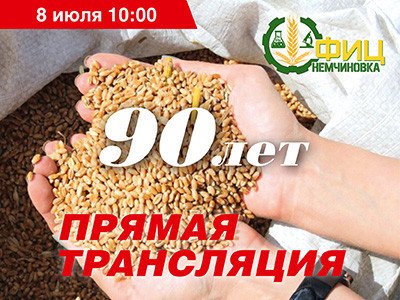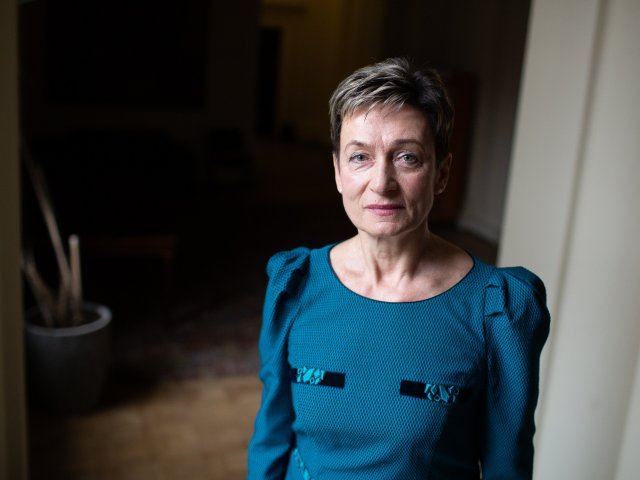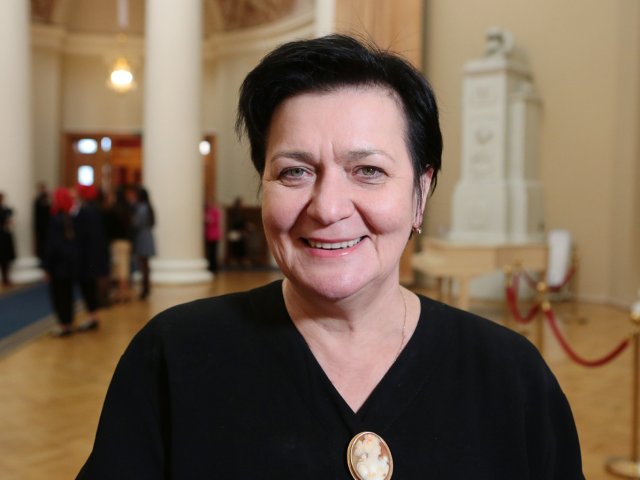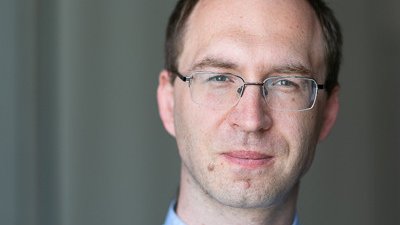In the Year of Science and Technology the Nemchinovka Federal Research Center celebrates its 90th anniversary, holding a conference titled Modern Applications of Innovative Technologies to Address Problems of the Agricultural Industry Complex.
Growing baking-quality grain in the Non-Black Earth Belt was deemed an impossible feat just 20-30 years ago when grain had to be shipped from Southern Russia. Thanks to unique cultivars, grain crops are now abundant nationwide from Kaliningrad to Sakhalin. They were bred by researchers at Nemchinovka.
“The Nemchinovka Center is a guarantee that the Central Russia where the most of the population lives will be well-fed,” says journalist Vladimir Lubarev who has long been friends with specialists of the center. Today the developments of the Center make obtain unique, top-quality varieties of wheat and cereals available across all of Russia except the Arctic. Grain bred in Nemchinovka is world’s best when it comes to quality. Nemchinovka varieties are rich in protein, up to 20 percent, and gluten, 32 to 40 percent.
One in five loaves of bread is baked from the grain that researchers at the Center have been breeding for years: it germinates on eight million hectares of fields in Russia every year.
On July 8th and 9th, the Nemchinovka Federal Research Center will host an International Conference on Scientific and Applied Research, Modern Applications of Innovative Technologies to Address Problems of the Agricultural Industry Complex. The discussion will be attended by leading specialists in agriculture from Russia, Belarus, Kazakhstan, Moldova, Hungary, Serbia, Germany, France, as well as representatives of the Ministry of Higher Education and Science of Russia, the Ministry of Agriculture of Russia, ministries and departments of agriculture of constituent subjects of the Russian Federation.
Scientific Russia Portal is broadcasting the first day of the conference live. Please join us!
10:04. Sergey Voronov, director of the Nemchinovka Center, delivers a welcome word to the participants.
10:06. Arkady Dvorkovich, Chairman of the Skolkovo Foundation, speaks. “We will continue to invest in the agricultural complex. We see great prospects there. We are confident in the Nemchinovka team.”
10:08. Mr. Voronov gives a historical account on the development of Nemchinovka. “Hardly there is anyone who never heard about Nemchinovka. In 1931 we ventured boldly into breeding and farming. The Nemchinov brothers held their experiments here at first.”
10:10.Every year, experimental fields and laboratories at Nemchinovka receive hundreds of scientists, managers and agricultural experts pursuing advanced training and university students and postgraduates for hands-on experience.
10:12. The history of the institute is associated with the names of famous researchers: breeders, farming experts, seed growers and biologists. They make up the hall of fame of the Russian agricultural science: Lisitsyn, Tsitsin, Poddubnaya-Arnoldi, Pisarev, Varenitsa, Nettevich, Lapchenko, Gulyayev, Sdobnikov and others. The staff of the Institute carefully maintains and furthers the traditions of the Nemchinovka School of Breeding and Farming.
10:14. Its key directions include breeding and seed growing of cereals and legumes, as well as the development of zone farming systems.
10:15. “Researchers at Nemchinovka have made a great contribution. Not only to breeding but to the agricultural science in general,” notes Mr. Voronov.
10:17. A hybrid of wheat and rye was bred in Nemchinovka.
10:19. 12 new varieties are now in development.
10:22. “Our cultivars are sown in 12 regions of Russia on 8 million hectares”, says the director of Nemchinovka.
10:24. Guests and participants of the conference are welcomed by Pyotr Alexandrovich Kucherenko, State Secretary and Deputy Minister of Science and Higher Education. Pyotr Kucherenko awards outstanding researchers from Nemchinovka.
10:27. The staff of the scientific center receive awards and words of gratitude for their work.
10:32. Pyotr Kucherenko makes another reminder about the importance of vaccination at a difficult time when a new wave of coronavirus infection is sweeping across the country.
10:33. Yuri Fedorovich Lachuga, RAS Academician, delivers a speech.
10:34. “Cultivars, varieties and hybrids bred here are sown in 12 regions of Russia. These figures speak for themselves.”
10:36. Yuri Lachuga noted ensuring food security and expanding the export potential of Russia remain top-priority objectives of agrarians and breeders.
10:38. Yuri Lachuga thanks Sergey Voronov who succeeded in a long career from an employee to a director. “I wish you to succeed in that mission. Please keep up the good work.”
10:40.“I believe there are still a lot of problems ahead to be solved by the Nemchinovka team. But they rightfully belong to you,” notes Mr. Lachuga.
10:42. Yuri Lachuga reads out a greeting address from Alexander Sergeev, President of the Russian Academy of Sciences, Nikolay Dolgushkin, Chief Scientific Secretary of the Presidium of RAS, as well Irina Donnik, Vice President of RAS.
10:44. Colleagues form the Department of Agricultural Sciences of RAS deliver their greetings for the 90th anniversary of the Center.
10:45. Nemchinovka researchers receive honorary letters from the Academy of Sciences.
10:46. Certificates of authorship are presented to breeders.
10:48. Andrey Ivanov, academician of the RAS, delivers his greetings. “We are glad to be present here and cordially congratulate the staff of the center. Of course, we are seeing new aesthetics in science that promote creative, productive work. But let us not forget that in a different country called the Soviet Union, Nemchinovka held an important place,” said Andrey Ivanov.
10:50. “We felt ourselves to be highly demanded and needed. It was a good creative job. Despite the difficulties we worked for the benefit of the country. Today you are at a new stage,” said Andrey Ivanov handing over a gift to the Director, Sergey Voronov.
10:53. Andrey Ivanov presents a document adopted by the Federation Council laying out recommendations on the development of Russia’s agricultural industries up to 2030.
10:56. Vladimir Kosolapov, RAS Academician, speaks.
11:00. “We are proud of the achievements of your researchers. Visiting Nemchinovka’s fields is a real holiday.”
11:03. “History is about people,” said Mr. Voronov congratulating the academician Valery Kiryushin from the Nemchinovka staff who celebrated his 80th birthday this year.
11:08. “I’m rarely invited to deliver congratulations, I’m mainly asked to work,” Valery Kiryushin responds with a joke. He delivers a report on the problem of declining agricultural production in the Non-Black Earth Belt since 1990.
11:10. According to the academician, there has been a twofold reduction of the area under cultivation, a 6-fold decline in the production of winter rye, a 6.4-fold decline in flax fiber production, a decrease in vegetable production by 246 thousand tons and a 2.7-fold drop in milk production.
11:12. Valery Ivanovich talks about the history of the Russia’s agricultural industry complex.
11:16. The first charts for assessment of arable lands had already been in use in the last century.
11:18. Valery Ivanovich speaks about the tasks of modernization of agriculture. “We have to develop models of terrain-adaptive farming systems for agroecological groups of lands with land type-specific packages of agricultural technologies, to draw up regional and federal registers of agricultural technologies and machines, along with registers of crop varieties, and to establish innovative technology and educational centers at agricultural universities and zonal research institutes.”
11:22. Valery Kiryushin identifies prerequisites for modernizing agriculture: adjusting the course of economic development, adopting state policy and agricultural policy, incentivizing businesses and innovators, and developing the asset base.
11:28. It is also necessary to redistribute functions between the RAS, the Ministry of Agriculture and the Ministry of Science and Higher Education.
11:31. Questions and comments are sounded by the audience.
11:35. Anatoly Goncharenko, RAS Academician and Chief Researcher of the Nemchinovka Center, delivers his speech.
11:38. Under Goncharenko’s leadership, large-scale breeding work is underway to breed CMS-based F1 heterozoic hybrids of winter rye. Early successes include the creation of Nemchinovsky 1 interline F1 hybrid that has been handed over for state testing.
11:41. Based on the group’s developments under Goncharenko's leadership, an original concept of prospective directions of rye breeding for targeted uses, including food, feed and technical applications, has been formulated.
11:43. As far as practical breeding is concerned, a new process design for the breeding of winter rye developed by the Nemchinovka team using the method of pairwise hybridization and cloning has been successfully implemented.
11:47. Boris Boincean, Professor, Director of the Selectia Research Institute for Field Crops in the Republic of Moldova, delivers his speech.
11:52. Moldovan Agriculture fails to ensure sustainable development in economic, environmental and social aspects.
11:57. Modern farming faces many challenges arising from the predominant industrial intensification model. These include: rising prices of non-renewable energy sources and their derivatives (mineral fertilizers, fuels, pesticides, etc.), deteriorating economic conditions at farms due to disparity of prices for agricultural vs. industrial products, degradation and pollution of natural resources (soil, water, air) and others.
12:02. “For sustainable and adaptive soil management, that is, to maintain their health and quality, fresh sources of organic matter – carbon – need to be regularly introduced into soil as food for soil biota in sufficient quantities,” says Professor Boincean.
12:05. “Modern means of agriculture intensification boost yields, albeit disproportionately, while simultaneously accelerating mineralization losses of organic matter in the soil, therefore promoting global warming caused not only by the release of carbon dioxide into the atmosphere, but also nitrogen oxides,” said the scientist.
12:08. “Farmers should be supported on the grounds of ecosystem and social services they provide.”
12:09. Accumulation of organic matter in soil (carbon sequestration) contributes to a significant slowdown in global warming.
12:11. Dr. János Molnár, a colleague from Hungary and an EU expert, speaks.
12:13. Dr. Molnár notes that it is important to develop international professional relations.
12:17. The legal component in regulating the system of plant disease prediction is crucial.
12:21. Since 2012, the National Association of Farmers has been involved in the work on predictive disease monitoring.
12:25. János Molnár speaks about the Hungarian experience with crop protection.
12:28. Sergey Belopukhov delivers his presentation.
12:31. Gennady Karlov, RAS Academician, speaks.
12:35. Yekaterina Zhuravleva delivers her welcome address. “The most important thing is to preserve our traditions as well as the genetic material that is represented in collections and fields.”
12:37. The institute is congratulated on the occasion of its anniversary by colleagues from the Federal Research Center of Vegetable Farming.
12:43. Mr. Voronov notes that July 8 is celebrated in Russia as the Day of Family, Love and Faithfulness. “Science is like a big family.”
12:45. Anatoly Medvedev, RAS associate follow, speaks.
12:47. “Many generations of great scientists have worked here. And we are continuing their tradition.” Anatoly Mikhailovich presents the anthem of Nemchinovka.
12:49. The webcast is over. Thank you for joining us!






















